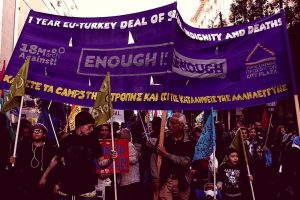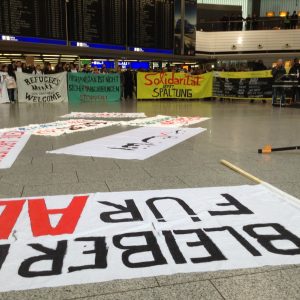Kompass – AntiRa – Newsletter Nr. 58, April 2017


Dear friends, „So schaffen wir das - eine Zivilgesellschaft im Aufbruch“ („This is how we can make it – civil society setting out“. This ist he title of a recently pulished book well worth reading which determines: „Between 2015 and 2016 around 15000 projects which found creative replies tot he manifold challenges of immigration came into being.” It goes on: “In this research project we attempted to take stock of the potentials of the movement on the basis of the analysis of 90 individual cases. We asked which specific challenges there exist in 13 different sectors – like housing, health care, judicial advice, and education – and how they were addressed. It became clear what great energy for handling social problems there is in current civil society. The projects reveal the potential for a new cooperation not just in dealing with immigrants but within civil society. It became especially obvious that these projects are more than the sum of isolated humanitarian initiatives. On the contrary they are a social movement with a unique profile. It is best characterized as a ´movement of citizens´. Its political core is the formation of political society on a local level.”
This book supports the thesis that on the local and everyday level a network of self-organization and support initiatives has become permanent. Diverse projects – “from sea rescue to solidarity city” – hold their ground against racist repressive politics and right-wing populist medial domination. “While deportation, closing-off and demoralization are the only answers in politics, the movement of citizens out of their own initiative has wound feasible paths to a more open society.”
At the same time the authors name their limitations: “The strengths of this movement are its weaknesses as well: The local and practical nature of the citizens´ movement makes it remarkably sustainable and stable. But it also leads to it being hardly visible on a transregional and national level. Locally and in practice criticism of refugee politics is practiced but it is not articulated enough on a transregional and national level.”
But this might change in the months to come. “Get together”, a young federal network of the antiracist movement has recently agreed on a large common mobilization for September 2017. On 2nd September it will start with various decentral actions which will recall the historic breakthrough against the border regime of two years ago in Hungary. The March of Hope and the refugee Welcome of 2015 became points of reference for making public and transnationally connecting initiatives and struggles for two weeks according to local conditions. Afterwards, on the 16.9. and therefore one week before the federal election Berlin will be the focal point of a nationwide mobilization. “We´ll come united” is the slogan for the planned mixture of a large demonstration, a parade and a political Community Carnival in the capital city. There will be intense mobilization over the next months, especially on a local level, but there will be transregional opportunities as well: from the church congress in May in Berlin and 20 years of no one is illegal at the documenta in Kassel in June to the G20 summit in Hamburg in July.
T seems bold and ambitious to suggest travelling to Berlin on chartered trains – new “trains of hope” - on the 16.9., but we will need exactly this kind of idea for the mobilization to accelerate and for the antiracist movement to unfold its potential for increased public visibility in everyday struggles.
Greetings in solidarity from the Kompass team
